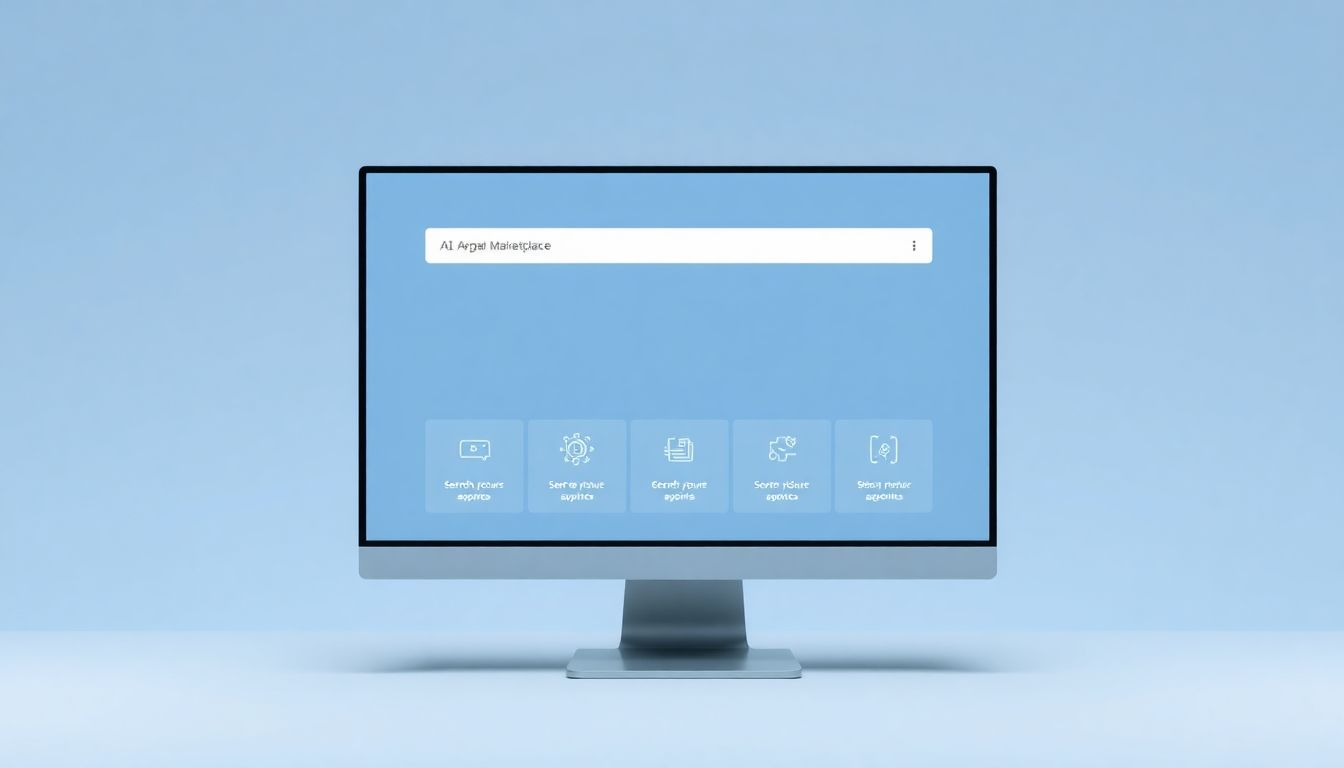Stick around, and I’ll explain what an AI opportunity marketplace is all about, who’s using it, and the trends that will define the future. Plus, I’ll give you simple steps to start exploring this exciting space and how it could boost your business down the line. Sounds good? Let’s get into it!
Key Takeaways
Key Takeaways
- AI marketplaces in 2025 are online platforms where businesses and developers buy, sell, and exchange AI tools and data. They are expected to be a major driver of AI growth, making solutions more accessible and trading safer.
- Using these platforms can save businesses time and money by providing verified, high-quality AI assets, plus exposure for sellers. They help speed up AI adoption and expand networks.
- Key trends include the rise of generative AI, focus on trust and security, industry-specific solutions, and community features. These trends improve the quality, safety, and relevance of AI solutions.
- Marketplaces connect buyers and sellers through filters, reviews, and secure payment systems, making transactions straightforward and trustworthy. Clear communication and understanding licensing are essential.
- Challenges involve verifying assets and avoiding fraud, as well as managing ethical issues like data privacy and bias. Caution and verification are crucial to avoiding risks or unethical projects.
- Getting started involves identifying your needs, choosing trustworthy platforms, creating detailed profiles, and testing assets with small investments. Active engagement helps build trust and improve offers.
- In the future, AI marketplaces will have more niche solutions, better verification, and focus on ethical AI. They could use blockchain for transparency, helping companies grow faster and access global AI solutions, with the AI market projected to reach $1.77 trillion by 2032.

1. What Is the AI Opportunity Marketplace in 2025?
The AI opportunity marketplace in 2025 is a digital platform where businesses, developers, and entrepreneurs come together to buy, sell, and exchange AI-powered tools, solutions, and digital assets. It’s like eBay or Amazon, but exclusively for AI assets, making it easier to find new opportunities or offload projects. These platforms connect sellers of AI solutions—like custom models, apps, or datasets—with buyers looking to integrate AI into their operations. The market is booming, with the global AI industry worth about $758 billion this year, and marketplaces are predicted to be a key driver of growth, helping to streamline transactions and foster innovation. Think of it as a marketplace designed specifically to match AI developers with those who need their solutions, all while ensuring transparency, security, and trust. Platforms such as sellaitool.com serve as a hub for this thriving ecosystem, offering verified listings and secure transactions. As the AI market expands rapidly—expected to hit $3.7 trillion by 2034—these marketplaces will play a vital role in making AI more accessible and easier to trade. In short, they’re the digital marketplaces fueling the next wave of AI innovation and business growth in 2025 and beyond.
2. How Your Business Can Benefit from AI Marketplaces Today
If you’re wondering how to tap into AI marketplaces now, the good news is that they can bring serious value to your business. Whether you’re a company looking for powerful AI tools or an entrepreneur wanting to sell your AI solutions, these platforms can save you time and money. For buyers, they offer a curated selection of verified, high-quality AI products—no more endless searching through unreliable sources. For sellers, marketplaces provide a trusted space to showcase your solutions, get exposure to serious buyers, and secure transactions with built-in escrow services. The ability to access detailed analytics and performance data means you can make smarter decisions—knowing exactly what you’re buying or selling. Additionally, marketplaces like sellaitool.com make it easy to list assets with clear revenue figures, growth metrics, and competitive pricing, helping you close deals faster. Companies that embrace these platforms report faster adoption of AI, reduced transaction risks, and access to a broader network of AI enthusiasts. Whether you’re scaling up, diversifying your tech stack, or selling an AI-powered project, leveraging these marketplaces can give your business a competitive edge today and prepare you for the growth ahead.
3. Key Trends Shaping AI Marketplaces in 2025
AI marketplaces in 2025 are influenced by several big trends that shape how they operate and grow. First, there’s the rise of generative AI, which has created a $644 billion market—growing 76% over 2024—leading to more innovative and specialized solutions being traded online. Next, security and trust are more important than ever, so marketplaces are integrating advanced verification processes, escrow services, and transparent review systems to prevent fraud. Customization and niche markets are also gaining traction, with platforms catering to specific industries like healthcare, finance, or gaming, making it easier to find tailored AI tools. Additionally, the rise of AI-as-a-service (AIaaS) means more solutions are offered as plug-and-play assets, which fit perfectly into marketplace models. We’re also seeing an increase in community-driven features—like user reviews, collaboration opportunities, and shared growth metrics—which foster a sense of trust and transparency. Lastly, the overall AI market is projected to grow at an annual rate of nearly 28%, reaching about $826 billion by 2030, which signals continuous demand for structured, secure marketplaces. Platforms that adapt to these trends—focusing on security, specialization, and community—will lead the pack in 2025 and beyond.

4. How AI Marketplaces Connect Buyers and Sellers: The Inside Scoop
AI marketplaces function as digital matchmakers, bringing together those with AI solutions and those needing them.
Buyers can range from startups to large enterprises looking for specific AI models, datasets, or tools to improve their products or services.
Sellers include AI developers, data scientists, and companies offering custom AI solutions or pre-built assets.
Platforms typically use search filters, categories, and recommendation engines to help users find the right assets quickly.
Secure systems like escrow services and verified listings add trust to transactions, reducing risks of fraud or misrepresentation.
Some marketplaces also facilitate collaboration features, like forums or project boards, to help buyers and sellers communicate directly.
Examples such as sellaitool.com illustrate how streamlined these connections can be.
Key tips for leveraging these platforms include: first, clearly define what you need or offer, then use specific filters to narrow your options.
Always check reviews and seller ratings—these small steps go a long way in avoiding scams or low-quality assets.
Finally, don’t forget to review licensing terms and usage rights to stay compliant with AI asset restrictions.
5. The Challenges and Ethical Concerns in AI Marketplaces
Despite their many benefits, AI marketplaces face hurdles like verifying the authenticity of assets and preventing fraud.
Fake or low-quality solutions slipping through can hurt buyers and damage trust in the platform.
Ethical issues also pop up around data privacy, bias in AI models, and potential misuse of sensitive information.
Many platforms are working to clear these hurdles by deploying more rigorous verification processes and transparent review systems.
Another concern is the risk of contributing to unethical AI applications, like deepfakes or biased decision-making tools.
Developers and buyers should ask hard questions about the purpose and training data of AI assets they purchase or sell.
Marketplaces need clear policies and guidelines to promote responsible AI commerce, but there’s still room to improve.
To reduce risks, always opt for assets with verified credentials and check how the solution was trained and tested.
Being informed and cautious can help you avoid getting involved in projects that might backfire ethically or legally.
6. How to Successfully Enter the AI Marketplace: Your First Steps
If you’re new to AI marketplaces, the good news is it’s easier than you think to get started.
First, identify your needs: are you searching for AI tools to improve productivity or maybe datasets for research?
Next, pick a marketplace platform that aligns with your goals—look for trustworthy sites with good reviews like sellaitool.com.
Create a profile, which often involves verifying your identity to enhance platform security.
When listing your AI assets, be detailed and honest about their functionalities, training data, and performance metrics.
Use keywords wisely so your listings appear in relevant searches; think about what buyers would search for.
To buy, start with small, well-reviewed assets to test how they perform before making larger commitments.
Always check licensing terms and consider testing samples or demos when available.
Keep an eye on transaction feedback, and don’t be afraid to reach out directly for clarifications or customizations.
Lastly, stay active and engaged—respond promptly to inquiries and update your listings to reflect new features or improvements.
7. What’s Next? The Future of AI Marketplaces and Business Growth
As AI tech continues to grow, marketplaces are set to become even more central to how businesses adopt and leverage AI.
In the coming years, we’ll see a broader diversity of AI solutions tailored for niche industries—like agriculture, logistics, or legal services.
Marketplaces will likely integrate more advanced tools for verifying asset quality, including AI-powered vetting and performance testing.
This means buyers can expect increased confidence and fewer worries about scams or low quality.
We’ll also see more focus on ethical AI, with marketplaces promoting responsible solutions and transparent data sourcing.
Blockchain technology might play a bigger role by providing immutable records of asset provenance.
For companies, engaging with AI marketplaces can accelerate digital transformation and open up new revenue streams.
Small players who leverage these platforms can scale faster by accessing a global pool of AI solutions and expertise.
Looking ahead, mastering these marketplaces is a smart move—since the global AI market is projected to hit $1.77 trillion by 2032, according to forecasts.
FAQs
The AI Opportunity Marketplace in 2025 refers to a platform connecting businesses and developers to buy, sell, and share AI solutions, fostering innovation and collaboration across industries. It aims to streamline AI deployment and create new growth avenues.
Businesses can access a wider range of AI tools, reduce development costs, and accelerate innovation by participating in AI marketplaces. They also gain opportunities for collaboration and access to specialized AI solutions tailored to their needs.
Key trends include increased use of AI-driven platforms, integration of ethical standards, expanded collaboration features, and greater specialization in AI services, all aimed at fostering innovation and trust in the marketplace ecosystem.